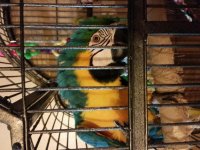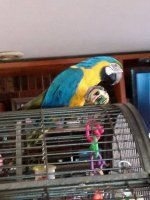momma2three
New member
Hi everyone. I have a 5 1/2 year old B&G macaw named Louie. I have had him for around 9 months. He is rescued from a home where he was getting hit with his perches. Only one person in my house can interact with him anyone else he tries his best to basically attack them. I am wondering if their is anything we can do to gain more of his trust, to really show him he's safe here. 




